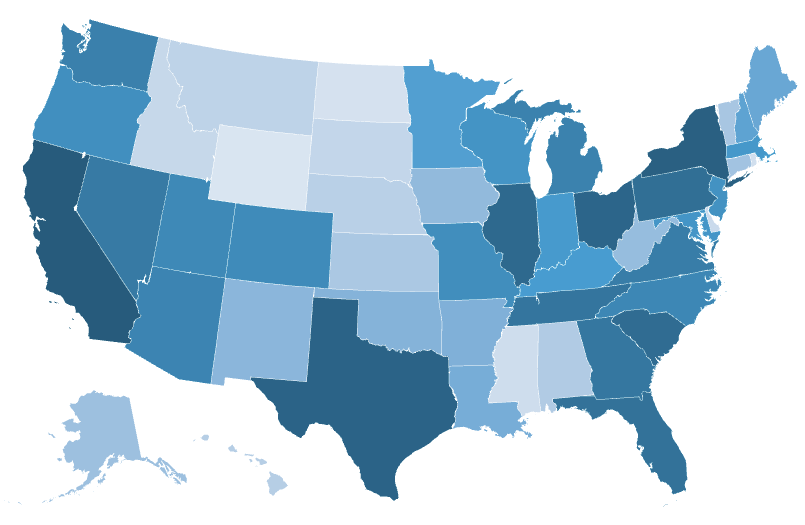Protecting Seniors From Government Impersonation Scams: How to Spot, Prevent, and Report Fraud
- What Is a Government Impersonation Scam Targeting Seniors?
- How Do Government Impersonation Scams Work?
- Common Tactics in Government Impersonation Scams
- US Heat Map – Government Impersonation Scam Targeting Seniors (2024)
- Seniors Affected by States
- Red Flags of a Government Impersonation Scam
- Why Are Seniors Targeted?
- How to Protect Yourself
- If You Suspect a Government Impersonation Scam
Already been scammed? Read our First 24 Hours Emergency Guide for critical steps to take immediately.
What Is a Government Impersonation Scam Targeting Seniors?
A government impersonation scam targeting seniors is a type of fraud where criminals pretend to be officials from government agencies (such as the Social Security Administration, IRS, Medicare, or local law enforcement) in order to trick older adults into sending money, revealing personal information, or sharing financial details. These scams exploit seniors’ respect for authority and fear of legal or financial trouble.
How Do Government Impersonation Scams Work?
Scammers may contact seniors by:
- Phone calls (“robocalls” or live calls)
- Letters or official-looking emails
- Text messages
- Pop-up alerts on computers
They often claim to be from agencies like:
- Social Security Administration (SSA)
- Internal Revenue Service (IRS)
- Medicare
- U.S. Marshals, FBI, or local police
Common messages include:
- “Your Social Security number has been suspended due to suspicious activity.”
- “You owe back taxes and must pay immediately to avoid arrest.”
- “There is a problem with your Medicare account; you must verify your information.”
- “You missed jury duty and must pay a fine to avoid jail.”
Scammers typically use threats of arrest, loss of benefits, or legal action to create fear and urgency, pressuring victims to act quickly.
Common Tactics in Government Impersonation Scams:
- Use of official-sounding language, fake badge numbers, or forged documents
- Caller ID “spoofing” to make it look like a real government number
- Demanding payment through untraceable methods (gift cards, wire transfers, cryptocurrency)
- Insisting on secrecy, urging victims not to talk to family or friends
US Heat Map – Government Impersonation Scam Targeting Seniors (2024)

Seniors Affected by States
| Rank | State / Territory | Government Impersonation |
| 1 | California | $43,867,529 |
| 2 | New York | $14,771,954 |
| 3 | Texas | $12,314,608 |
| 4 | Ohio | $9,558,840 |
| 5 | Illinois | $9,407,033 |
| 6 | South Carolina | $9,134,309 |
| 7 | Pennsylvania | $8,733,820 |
| 8 | Florida | $8,230,216 |
| 9 | Tennessee | $7,733,586 |
| 10 | Georgia | $6,913,124 |
| 11 | Nevada | $6,909,685 |
| 12 | Virginia | $6,754,487 |
| 13 | Washington | $5,900,010 |
| 14 | Michigan | $5,692,098 |
| 15 | Arizona | $5,604,144 |
| 16 | North Carolina | $5,032,613 |
| 17 | Utah | $4,725,593 |
| 18 | Colorado | $4,448,272 |
| 19 | Missouri | $4,366,024 |
| 20 | Oregon | $4,240,736 |
| 21 | New Jersey | $3,899,187 |
| 22 | Wisconsin | $3,500,307 |
| 23 | Maryland | $3,148,819 |
| 24 | Massachusetts | $2,833,571 |
| 25 | Indiana | $2,265,961 |
| 26 | Kentucky | $2,248,787 |
| 27 | Minnesota | $1,700,339 |
| 28 | New Hampshire | $1,533,153 |
| 29 | Maine | $1,461,458 |
| 30 | District of Columbia | $1,161,895 |
| 31 | Louisiana | $1,122,021 |
| 32 | Arkansas | $1,047,559 |
| 33 | Oklahoma | $1,045,810 |
| 34 | New Mexico | $912,252 |
| 35 | Iowa | $822,716 |
| 36 | West Virginia | $804,125 |
| 37 | Alaska | $748,439 |
| 38 | Connecticut | $687,298 |
| 39 | Vermont | $623,501 |
| 40 | Kansas | $584,210 |
| 41 | Alabama | $533,055 |
| 42 | Hawaii | $483,660 |
| 43 | Nebraska | $335,847 |
| 44 | Montana | $294,940 |
| 45 | South Dakota | $264,301 |
| 46 | Idaho | $212,217 |
| 47 | Delaware | $187,370 |
| 48 | Mississippi | $143,540 |
| 49 | Rhode Island | $92,020 |
| 50 | North Dakota | $61,000 |
| 51 | Wyoming | $39,270 |
| 52 | Puerto Rico | $23,000 |
Red Flags of a Government Impersonation Scam:
- Unsolicited calls or messages claiming urgent legal or financial trouble
- Requests for payment by gift card, wire transfer, or cryptocurrency
- Threats of immediate arrest, deportation, or loss of government benefits
- Pressure to act quickly and not consult anyone else
- Requests for personal information like Social Security number or bank account details
Why Are Seniors Targeted?
- Seniors may be more trusting of authority and less familiar with scam tactics
- Many rely on Social Security, Medicare, or other benefits and fear losing them
- Criminals hope to scare victims into quick action before they verify the claims
How to Protect Yourself:
- Remember: Real government agencies never demand payment by gift card, wire transfer, or cryptocurrency
- The IRS, Social Security, Medicare, and law enforcement do not threaten arrest over the phone or demand personal details by email or text
- Never provide personal or financial information in response to unexpected contact
- If in doubt, hang up and call the agency directly using the number from their official website
- Talk to a trusted family member or friend before sending money or information
- You can follow our training to further enhance your knowledge and skills against government impersonation scam.
If You Suspect a Government Impersonation Scam:
- Hang up immediately and do not engage
- Do not send money or share personal information
- Report the scam to the Federal Trade Commission (ftc.gov), Social Security Administration Office of Inspector General (oig.ssa.gov), or the FBI’s Internet Crime Complaint Center (ic3.gov)
- Notify your bank if money was sent or sensitive information was shared
State-Specific Government Impersonation Scam Resources
Find detailed government impersonation scam prevention guides and local reporting contacts for your state:
- California Government Impersonation Scam Resources – $44M lost by CA seniors
- Texas Government Impersonation Scam Resources
- Florida Government Impersonation Scam Resources
- New York Government Impersonation Scam Resources
- Arizona Government Impersonation Scam Resources
- Pennsylvania Government Impersonation Scam Resources
- Vermont Government Impersonation Scam Resources
View national elder fraud statistics | Find your state Attorney General

